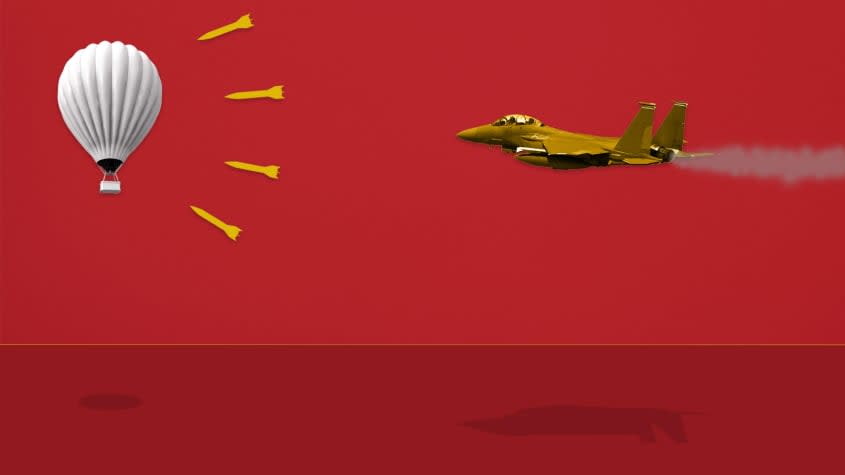Did shooting China's spy balloon show strength, or weakness?

Tensions are escalating between the United States and China over the fate of a suspected Chinese spy balloon that wafted through U.S. airspace before a fighter jet shot it down off the coast of the Carolinas on Saturday. China went from being apologetic about the balloon, which it said was a civilian weather probe that strayed off course, to expressing outrage over what it called an "overreaction" by Washington. The Biden administration says the balloon's route took it past some sensitive military sites, proving its purpose was espionage.
The balloon saga ignited a partisan brawl in Washington. Republicans claim the Biden administration looked weak by letting the balloon enter U.S. airspace. Biden administration officials noted that several Chinese balloons flew through U.S. airspace when former President Donald Trump was in the White House, and his administration did nothing about them. Was Biden's reaction a sign of weakness, or of his willingness to show Beijing that the U.S. won't tolerate any more of these intrusions?
Biden showed weakness by not acting faster
President Biden is taking a "victory lap" after the downing of the balloon, says The Wall Street Journal in an editorial, but don't fall for "the triumphalist White House spin." Biden didn't order the military to take it out until after it crossed over Alaska, passed over Canada, and then drifted over the U.S. from Montana to the Carolinas. "The justification for delay was the risk of falling debris, but that is hard to credit."
There are many theories for why Beijing would send a surveillance balloon into U.S. airspace. One is that "they wanted to test Mr. Biden." Would he boldly put China in its place by announcing the intrusion and blasting the airship out of the sky? Or would he keep quiet, as he did, until people spotted it on the ground, then dither before belatedly taking it out, hoping to "court better relations" with Beijing? "This is familiar Chinese diplomatic behavior to probe for weakness in an adversary." And they found it.
What nonsense. A balloon didn't threaten U.S. military superiority
The "Battle of the Balloon" was indeed alarming, says Max Boot in The Washington Post, but not because it posed "any actual threat" to U.S. security. It didn't. "The violation of U.S. airspace was unacceptable," but "it's doubtful that it gathered any intelligence that Chinese spy satellites cannot." And when the showdown came, there wasn't any doubt that "one of the most advanced U.S. weapons systems — an F-22 Raptor" — was going to win its one-sided dogfight with "one of China's most primitive surveillance systems: a balloon."
The biggest reason for concern was "the hysterical overreaction," which included Trump's claim that Biden had "surrendered American airspace to Communist China," even though similar things happened three times on his watch. Should Biden "have personally climbed into an F-22 cockpit and led the attack on the balloon"? "The reaction was so overwrought that Biden felt compelled to postpone Secretary of State Antony Blinken's trip to China. That's too bad." We need to be ways "prevent U.S.-China tensions from spiraling out of control," not needlessly escalating petty fights.
The balloon 'popped' a potential U.S.-China rapprochement
Considering the history of spying between the U.S. and China, "the current episode looks like a relatively minor infraction," says Gideon Rachman in the Financial Times. "Between 2010 and 2012, China is believed to have dismantled CIA operations within its borders — executing at least a dozen U.S. sources." A few years later, China had "hacked America's Office of Personnel Management," accessing the personal data of more than four million current and former federal employees.
There's little "trust or warmth" between Beijing and Washington. Gen. Mike Minihan, head of the US Air Mobility Command, even "recently predicted in a leaked internal memorandum" that the U.S. and China "will fight in 2025" over a Chinese attack on Taiwan. Moderates on both sides in recent weeks "had been cautiously trying to restart dialogue between the two countries." Blinken's visit to Beijing could have contributed to gradually improving relations. "Those efforts are over — for now. But in the long run, the stakes are too high for diplomacy between China and the U.S. to fall victim to a spy balloon."
China is the one that should apologize
"To avoid a catastrophic conflict, more pragmatic leaders on both sides must push back," says Minxin Pei in Bloomberg. But China's the one whose "actions caused this diplomatic crisis," so it's the one that "must move first." China's initial apology and "claim that the balloon was conducting climate research and was blown off course by strong winds, are scarcely believable." If this was an innocent mistake, Beijing could have fessed up the minute "the balloon supposedly went astray."
To set things right, "Chinese leaders must conduct a credible investigation into the incident and punish those responsible for the balloon's course, as well as those who should have informed the U.S. in a timely fashion." China also must drop its puffed-up outrage and "issue a stronger apology to the U.S. and Canada," publicly or through diplomatic channels. President Xi Jinping also could also call Biden to "underscore his commitment to a more stable relationship with the U.S." After triggering this crisis, "the least China can do is avoid causing further damage."
You may also like
Why scientists are worried about bird flu

 Yahoo Movies
Yahoo Movies 
